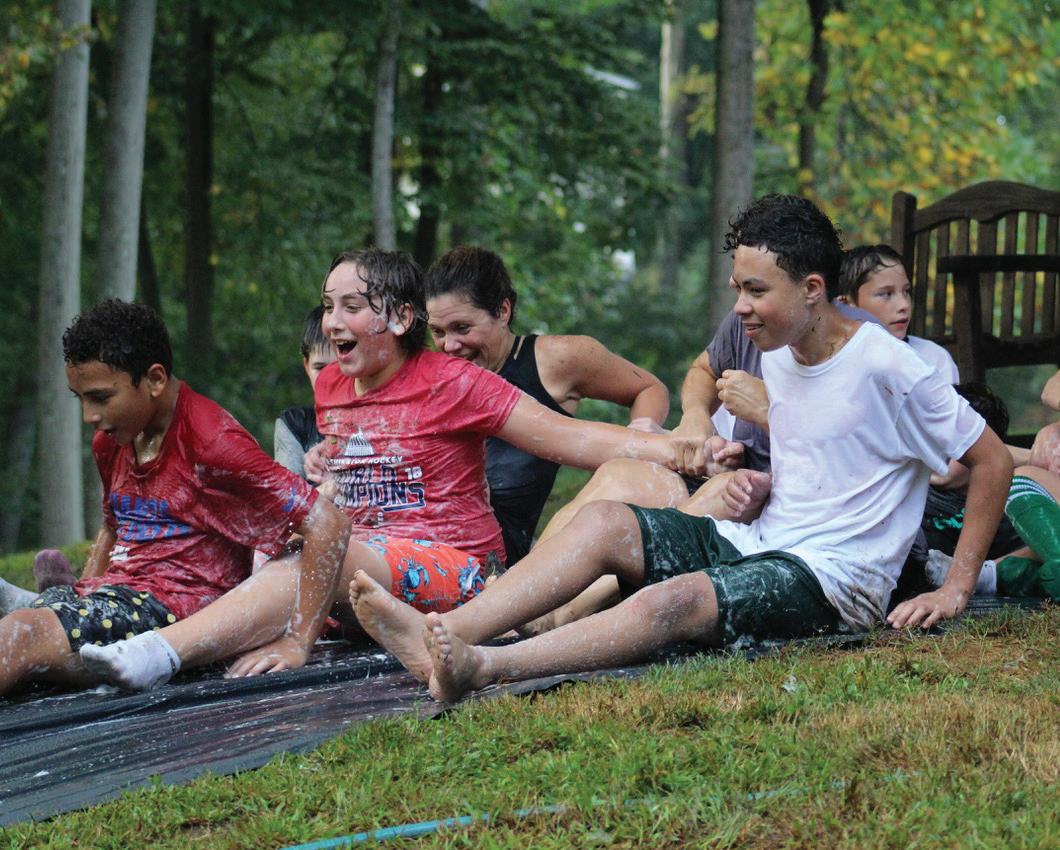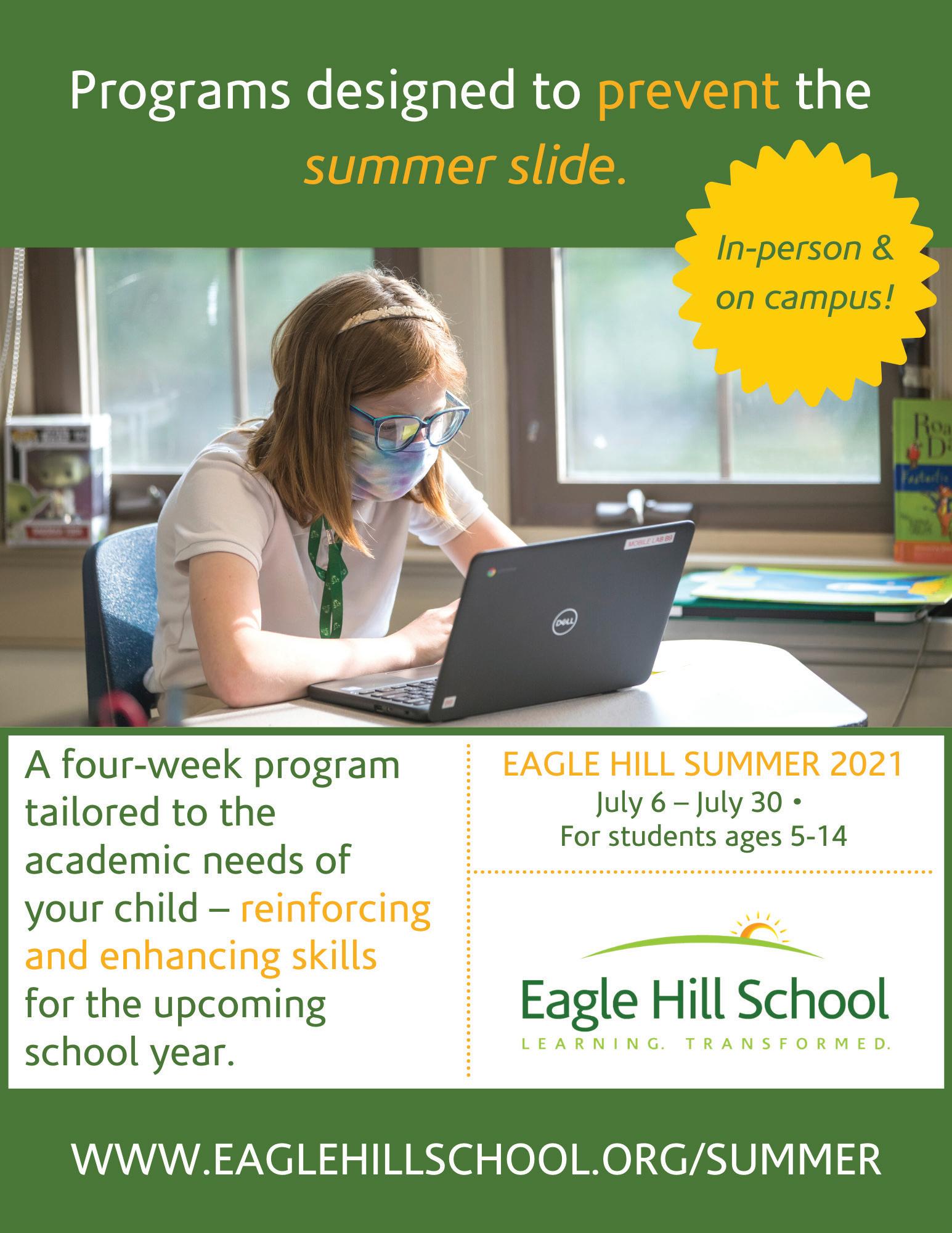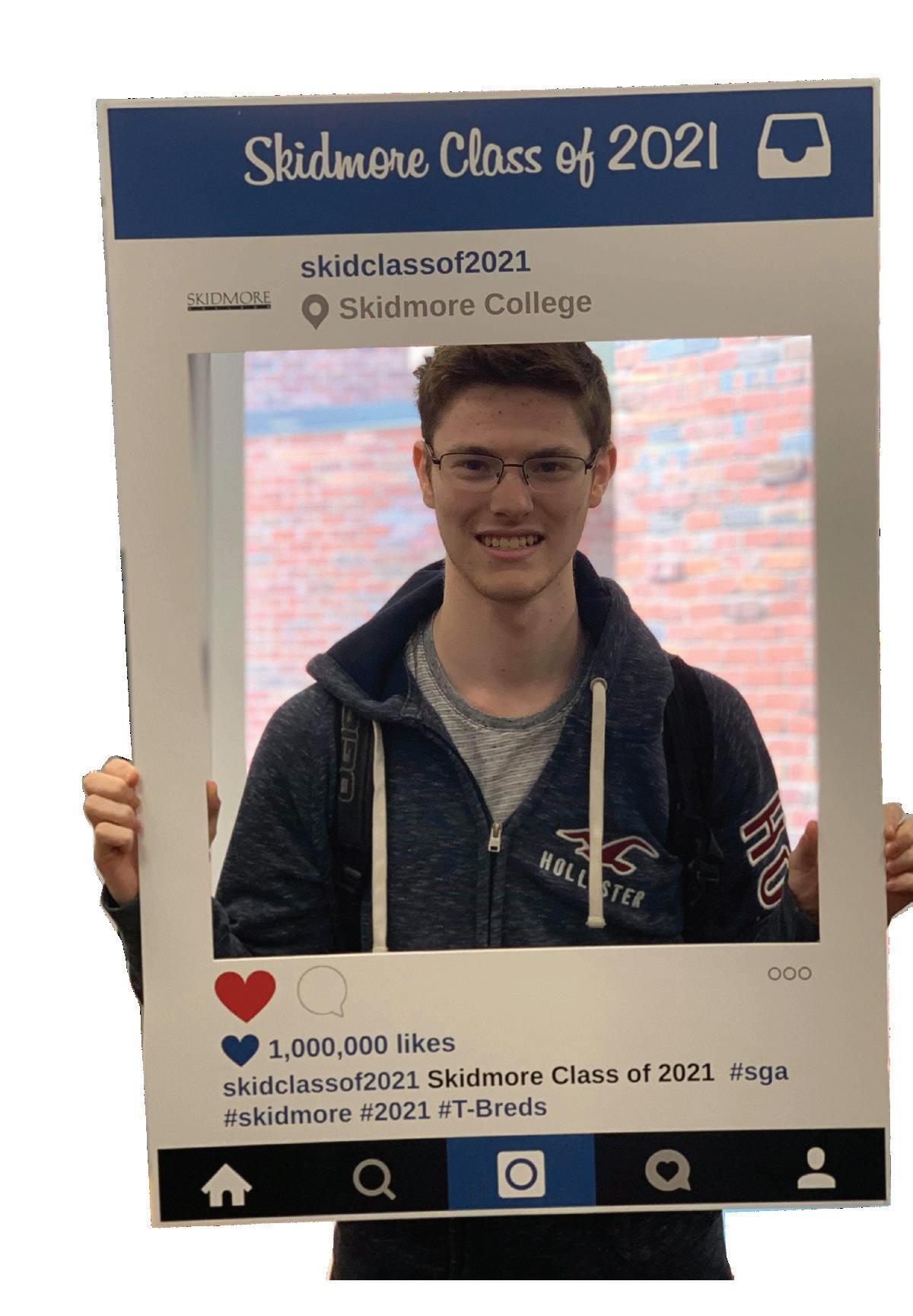
11 minute read
FROM THE DORM
EAGLE HILL’S JUNIOR BOARDING
PROGRAM RETURNING FOR THE 2021-2022 SCHOOL YEAR!
Advertisement

ABOARDING OPTION HAS BEEN AN IMPORTANT PART OF THE EAGLE HILL PROGRAM
since the founding of the school. Although over the years it has evolved from a seven-day program to a five-day program, the mission remains the same – to provide students with a safe and structured place to learn and socialize, reinforcing the skills students work on during the day as they further develop their confidence, independence, and self-advocacy. The 2020-2021 school year presented a number of challenges due to the COVID-19 pandemic, resulting in the suspension of the Junior Boarding Program. For next school year, administration at Eagle Hill is determined to bring the Program back, under the leadership of Joy Delisle, the Director of the Junior Boarding Program.

A CONTINUATION OF THE ACADEMIC DAY
At 4 p.m., when the school day ends, the afternoon is just getting started for students in the dorm. From about 4–6, students and staff take part in group activities like sports/games, arts and crafts, and community service opportunities, all before dinner, a proctored study hall, and free time. But it isn’t just about having fun –as the afternoon and evening go on, students are continuing to work on and hone their social and academic skills in a structured way. “It’s a predictable structure – and that’s what helps to get our students through the day successfully,” said Mrs. Delisle.
The dorm team is in frequent contact with the Academic Team and the Psychological Services Team, meaning that every student is able to work on their individualized goals during meals, study halls, and activity times. “The Boarding Program provides a wrap-around approach to care,” Dr. David Blank, Director of Psychological Services, explained. “We’re helping these students in the classroom during the day, but the dorm provides them the opportunity to flourish and thrive after school hours as well.”
AMY JO, EHS ALUMNI PARENT
Students have breakfast and dinner together, seated with a staff member, allowing for conversation to be directed and facilitated and making sure everyone is included. By 8 p.m. every night, students have free time in the dorm – playing cards or games, watching movies or sports, and just having fun with staff and with each other.
A COMMUNITY WITHIN A COMMUNITY
“There isn’t anything better that the dorm does than to create a community of kids within our community,” Assistant Head of School Tom Cone said. “Joy and her team do a miraculous job of helping the dorm kids learn – through experience – to be part of a community outside of their family. And that is magic.”
WHAT’S NEW THIS YEAR?
Students enrolled in the Junior Boarding Program will have the opportunity to add both academic depth and leadership opportunities through our Capstone Program. If it’s their final year at Eagle Hill, students will be assigned a mentor from the faculty to help design a year-long project that investigates a special interest or passion in depth. The Capstone Project could serve as a major talking point or a point of differentiation as students present themselves to various secondary schools.
Of course, planning is underway to ensure that everyone in the dorm is safe and healthy and follow any COVID-related protocols set by the state or the school. “We’re excited,” Head of Junior Boarding students have the unique opportunity to experi- School Jim Heus said. “We’re going to make this happen and ence everything about Eagle Hill, from breakfast in the morning to we’ll do it with great consideration for the health and safety for a game of foosball or S’mores at the fire pit at night. Not to men- our students and staff.” tion the fabulous trips students in the dorm take (usually three a year – including a camping trip and a trip to Hershey Park). “The trips really build our community and bring us together. The first trip helps us set expectations – what we expect from the students and what the stu- THE PARENT PERSPECTIVE dents expect from us,” Mrs. Delisle shared.
Even each dorm room is considered a “community” of its own, so the two students who share a space have to work on their interpersonal skills, conflict resolution, and self-advocacy in their shared living space.
SOCIAL SKILLS & INDEPENDENT LIVING SKILLS
Every moment is a teachable moment at Eagle Hill. And that means that students in the Junior Boarding Program are learning around the clock! “We are always working on independent living skills,” Mrs. Delisle emphasized. That includes following a schedule for getting ready for the day – brushing their teeth, combing their hair, making their bed, even putting a tie on (when required!).
We knew that Schuyler was going to boarding school after graduating from Eagle Hill and we all thought it might be helpful to have a better idea of what living in a dorm would be like. Not having to figure out the school and boarding parts simultaneously helped. Schuyler moved into the Eagle Hill dorm in the spring and the transition was smooth, in part because it’s a cozy set-up, you know everyone and it’s four or five nights a week. Being a boarder, you get to know some of your teachers better as they come through in the evenings for homework help. You realize that you really do know how to manage the everyday deadlines (homework, showers, laundry, wake-up) – and you learn to make your bed every day. As a day student, Schuyler had a long commute. As a boarder, he had hangout time after school and was able to wake up later in the morning. Pickup basketball games, hot chocolate by the fire pit, and community service work with friends were part of the routine, too. Yes, it was nerve-wracking to drop him off the first time, but we knew we were leaving him in the care of the kindest, most organized adults who have fun with the kids. He was happy, so we were happy. And, yes, even a couple of months in the dorm was enormously helpful preparation for full-time boarding.
ALUMNI PROFILE
BEN CANTER ‘13
BEN CANTER, EAGLE HILL CLASS OF 2013, IS A SENIOR AT SKIDMORE COLLEGE MAJORING IN PSYCHOLOGY. WHILE FINISHING HIS SENIOR YEAR AT HOME, HE IS A RESEARCH ASSISTANT AT THE NEW JEWISH HOME RESEARCH INSTITUTE ON AGING, WHERE HE’S CONDUCTING RESEARCH ON COVID-19 IN NURSING HOMES – STUDYING THE SURVIVABILITY, INSTITUTIONAL BARRIERS, AND REHABILITATION PSYCHOLOGY RELATED TO COVID-19. STARTING THIS SUMMER, BEN WILL ATTEND BOSTON UNIVERSITY TO GET HIS DOCTORATE IN OCCUPATIONAL THERAPY AND REHABILITATION SCIENCES.
What brought you to Eagle Hill?
I got kicked out of my fourth-grade book club in my public elementary school. I didn’t do anything crazy; I just didn’t do the readings. But I didn’t do the work because I had difficulties with reading comprehension and a really bad working memory—even if I could do the reading, I wouldn’t have remembered it! But my teacher didn’t understand what it meant to have a disability—I had a traumatic brain injury as a child—and instead of encouraging me to do my best, she kicked me out of the book club. There were plenty of other things I struggled with such as general executive functioning issues and slow cognitive processing that indicated I needed a change, but my dad has always said that the book club incident was the last straw.
What did you learn at Eagle Hill that helped you manage your learning difference?
Eagle Hill provided me with the tools to navigate all kinds of academic situations, but I would say self-advocacy is by far the greatest asset that I gained by attending Eagle Hill. The ability to advocate for oneself is monumental not just in school, but in life. As a kid, when I got nervous and didn’t know what to do or how to do something (which was often), I didn’t know how to ask for help. I am successful today only because Eagle Hill taught me to know when I need to solicit help from others, and how to ask for it. When you have difficulties learning—or really doing anything—there is no skill more valuable than knowing who and how to ask for help.
Beyond academics, what made Eagle Hill different from other schools?
I made the sports teams. In all seriousness, in retrospect I appreciate the physical activity requirement Eagle Hill has. I wasn’t and still am not super athletic, and it’s hard to want to and get exercise as a kid when you aren’t able to play sports. The fact that someone as uncoordinated as myself can feel comfortable playing soccer, Ultimate Frisbee, and even flag football, as I did, is truly a testament to the supportive and accepting community EHS fosters. Also, as a psychology major and future occupational therapist, I’d be remiss not to mention the physical and mental benefits that exercise has on all individuals no matter one’s level of athleticism.
Tell us about your educational journey after EHS.
After four years at Eagle Hill, I returned to my public school district for high school. After graduating high school in 2017, I applied and was accepted to Skidmore College, where I’m now a senior majoring in psychology. This summer, I will start at Boston University’s Sargent College to pursue an OTD/PhD dual degree in Occupational Therapy and Rehabilitation Sciences.
Any words of advice for current students?
Be confident and keep your goals in mind. Believe you can do anything you put your mind and time towards. Nobody can stop you from trying, so try till you succeed. When I returned to public school again, I was overwhelmed for a few weeks until I got my bearings. Then I worked harder than ever to show my parents and myself that I could excel there. Once I knew I wanted to go to Skidmore, and again when I knew I wanted to go to Boston University, I spent hours making sure my application was as good as possible. And I got in!
And for parents, I’d say believe your child can do anything they set their mind to. Parental/ guardian support is so important. If you had asked my parents if 10-year-old me who just got kicked out of book club would one day go on to get his doctorate, I don’t know if they could tell you they would have predicted it—they were just hoping I’d make it through the rest of the fourth grade at that point! But once they started to believe I could overcome anything, so did I. And that made all the difference.

During my sophomore year, I enrolled in Bridges to Skidmore, an integrative dance course in which Skidmore College students dance alongside adults with intellectual and developmental disabilities (IDD) twice a week. In the class, each student is assigned one to four dancers with IDD to choreograph and perform a dance together. My professor and I used Wii balance boards to measure the balance of those with IDD before and after the classes, and results showed that their balance improved! The following year, we co-wrote and published an article about the program’s impact in people with Down Syndrome in the International Journal of Exercise Science.
Tell us more about your work at the New Jewish Home Research Institute during the pandemic.
The New Jewish Home is a non-profit organization of skilled nursing facilities in the Westchester/New York City areas, and one of the only non-profit geriatric organizations in the country that consists of both clinical (nursing home/rehabilitation) as well as an established research institute.
Collaborating with researchers from The New Jewish Home, NYU, and Mt. Sinai Icahn School of Medicine, I am a co-author on a series of studies where we explore topics such as the epidemiology of and therapeutic recovery from COVID-19 in the geriatric population. Two of my favorite studies that we are doing are one on advanced directives during COVID-19, and another on the relationships between dementia and depression and COVID-19 rehabilitation outcomes. I will be presenting the findings of these two studies at the American Medical Director’s Association/Post-Acute and Long-Term Care conference and at the American Geriatrics Society conference in March and May 2021, respectively.
What have you learned as a student and a researcher during COVID-19?
So much—I am so lucky to be working with so many smart and generous people who serve as my professors, research collaborators, and mentors. Most importantly, I’ve learned how to be resilient, look on the bright side, and make the best of a bad situation. Originally, for the summer of 2020 I was hoping to do a paid internship as a rehab aide in a stroke rehabilitation center. But when they cut the program at the last minute due to COVID-19, my plans were dashed. I decided that I can’t control COVID-19 (other than by masking up and staying distanced), but that didn’t mean I need to sit around all day, so I emailed the Director of Research at The New Jewish Home and asked if they might have something for me to do. Looking back, I choose to see the summer program cancellation as a blessing in disguise—it allowed me to get the position I have now, learning from wonderful researchers and clinicians all the while contributing to society in a positive way.




